EDCTP Forum 2023 OPT-SMC project presentation
Regional partnerships for strengthening implementation research to improve access to SMC
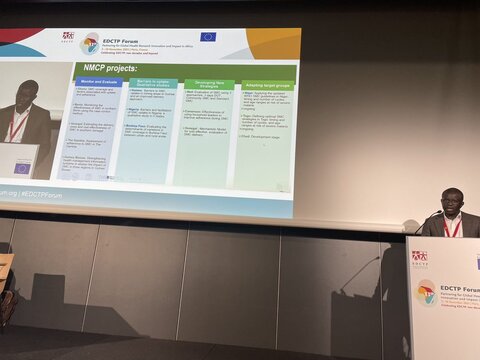
The OPT-SMC Seminar at the EDCTP Forum which took place from the 7-10th of November was opened by the project coordinator, Prof. Jean-Louis Ndiaye who shared on the progress on the project. He shared that six countries Nigeria, Ghana, Guinea, Mali, Burkina Faso and Cameroon have completed their projects while Benin and Senegal are analysing the results of their projects. Niger, Togo and the Gambia are still implementing their projects.
Scaling up SMC in Nigeria: Community perception and public engagement: a qualitative study in 5 states
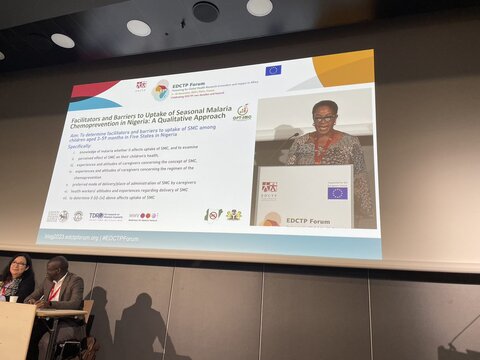
Dr. Nnena Ogbulafor of the NMEP of Nigeria presented the results of a qualitative study which was conducted in 5 states on community perception and public engagement. The results indicated that SMC was widely accepted as a key preventive measure of malaria infection and that caregivers generally trusted community drug distributors and preferred SMC delivered door-to-door than at fixed points. There were isolated cases of rejection and hesitancy as well as isolated concerns on perceived side effects and safety of medicine.
The NMEP intends to increase advocacy efforts for SMC at the community level and at all levels of government to increase national funding for the intervention.
Evaluating the determinants of variations in SMC coverage in Urban areas in Burkina Faso
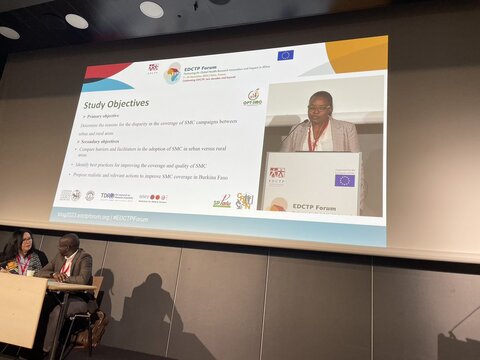
Dr. Aissata Kone of Burkina Faso presented the results of a study that evaluated the determinants of variations in SMC coverage in Urban areas in Burkina Faso.
Recommendations emanating from the study include organizing performance feedback meetings to enable stakeholders to share their experiences; caregiver administering drug under observation on the first day of the campaign; digitizing the campaign to improve data quality for better decision-making; involving and motivating community leaders in distribution in large towns; using social media networks for communication in urban centers to raise awareness a month before the campaign begins; collaborating with the Ministry of Education and day-care centers to reach children who are not at home; and integrating SMC into routine EPI activities.
Optimizing SMC delivery in Guinea An implementation research in the Siguiri mining zone
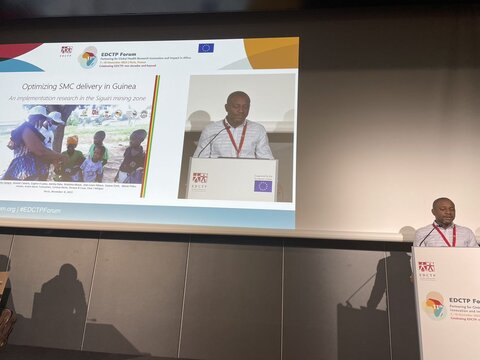
Guinea conducted an implementation research project in the Siguiri mining area in the country as there had been low uptake of SMC in that area.
At the end of the project factors by community members that were reported to facilitate uptake include perceived effectiveness and economic benefits of SMC while distributors reported that cooperation between local authorities, partners and community and on the job supervision facilitated in uptake. Barriers to uptake on the other and included SMC being perceived as poisoned because it is free as well as doubts about giving medicine to healthy children. Other barriers include distributors living lengthy distances from communities, high workload, and insufficient number of local advocates.
It was recommended that SMC delivery approaches need to be adapted to local contexts. Moreover, using local distributors as well as local advocated would increased trust and strengthen community mobilization. There is need to further research to understand barriers to putting these findings into practice for scaling up SMC in the area.
Evaluating three approaches to improve coverage and adherence of SMC in Dioila, Mali
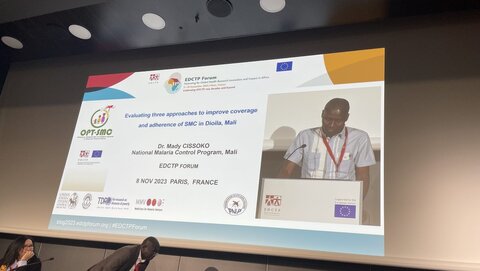
Dr. Madi Cissoko from Mali presented findings from a study that evaluated three approaches to improve coverage and adherence of SMC in Dioila. The study was undertaken due to the variable levels of SMC coverage across the country as well as questions about adherence to the 2nd and 3rd dose of amodiaquine (AQ).
Results from the study indicated that 3day directly observed therapy for SMC is becoming more widely used due to concerns about adherence despite it being costly. Caregivers and distributors also noted that there is poor adherence. However, it was agreed that strategies that were simpler than a 3day DOTs by SMC teams may be more effective.
Summary and forward looking for the control of seasonal malaria
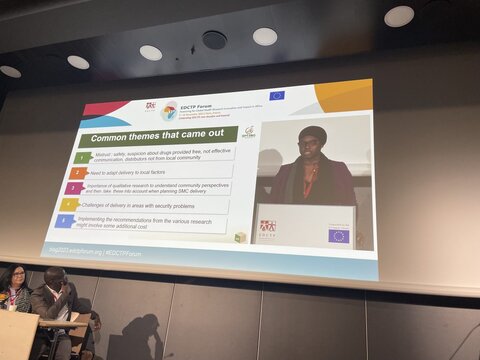
In closing, Dr. Fatimata Bintou Sall made a summary of all the OPT-SMC projects and discussed control measures for seasonal malaria. Key advantages that had come out of the OPT-SMC projects include the NMPs leading the research, identifying priority questions, conducting research, and putting the findings into practice. The countries also receive technical support while their capacities are strengthened in implementation research methods.
Frequent communications with each NMP and bringing all partners together through regular webinars and in-person meetings. The network of 13 countries formed also serves as a platform for sharing progress and lessons learnt.
Common themes for concern that came out include mistrust, need to adapt delivery to local factors, and importance of qualitative research to understand community perspectives. Moreover, iimplementing the recommendations from the various research works may involve some additional cost. In the future, interventions such as the malaria vaccine will complement SMC. Future interventions being investigated include monoclonal antibodies, and Long Acting Injectable antimalarials. However, all these interventions may have similar implementation challenges such as those encountered in implementing SMC and it is important to ensure that all children are reached.